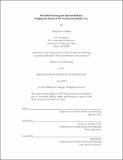| dc.contributor.advisor | Lawrence Vale. | en_US |
| dc.contributor.author | Yadegar, Daniel Aziz | en_US |
| dc.contributor.other | Massachusetts Institute of Technology. Dept. of Urban Studies and Planning. | en_US |
| dc.date.accessioned | 2012-10-10T15:49:51Z | |
| dc.date.available | 2012-10-10T15:49:51Z | |
| dc.date.copyright | 2012 | en_US |
| dc.date.issued | 2012 | en_US |
| dc.identifier.uri | http://hdl.handle.net/1721.1/73833 | |
| dc.description | Thesis (M.C.P.)--Massachusetts Institute of Technology, Dept. of Urban Studies and Planning, 2012. | en_US |
| dc.description | Cataloged from PDF version of thesis. | en_US |
| dc.description | Includes bibliographical references (p. 99-106). | en_US |
| dc.description.abstract | An increasing austerity at all levels of government has propelled a heightened focus on more efficient models of housing delivery, human service delivery and community development. One area of increased attention, with minimal empirical research, remains the integration of these three arenas. While the integration of such fields has been proposed conceptually for at least twenty years, there is little record of the challenges faced through integration or the proven benefits of such a model. This thesis looks at the integration of property management, wraparound services, and community building as implemented across three sites by the renowned nonprofit housing developer, The Community Builders, Inc. The process of integration, known as 'Ways & Means', remains in its nascent stages - programmatic goals remain undefined, making it difficult to provide a complete evaluation. What this thesis offers instead, however, is a formative evaluation in which stakeholders reflect upon Ways & Means as it has evolved thus far and recommendations for the initiative's improvement. Three pressing challenges are given central focus, namely (1) defining overall programmatic goals, (2) restructuring the organization to facilitate the integration of Ways & Means and (3) establishing an evaluative capacity for outcomes of the Ways & Means initiative. While this thesis was not sponsored or endorsed by Community Builders, research was conducted in close collaboration with senior leadership of the organization. Extensive interviewing offers a look at integration challenges from multiple perspectives - an overview potentially useful to other nonprofits or government entities interested in pursuing a similar endeavor. | en_US |
| dc.description.statementofresponsibility | by Daniel Aziz Yadegar. | en_US |
| dc.format.extent | 113 p. | en_US |
| dc.language.iso | eng | en_US |
| dc.publisher | Massachusetts Institute of Technology | en_US |
| dc.rights | M.I.T. theses are protected by
copyright. They may be viewed from this source for any purpose, but
reproduction or distribution in any format is prohibited without written
permission. See provided URL for inquiries about permission. | en_US |
| dc.rights.uri | http://dspace.mit.edu/handle/1721.1/7582 | en_US |
| dc.subject | Urban Studies and Planning. | en_US |
| dc.title | Affordable housing and upward mobility : bridging the divide at The Community Builders, Inc. | en_US |
| dc.type | Thesis | en_US |
| dc.description.degree | M.C.P. | en_US |
| dc.contributor.department | Massachusetts Institute of Technology. Department of Urban Studies and Planning | |
| dc.identifier.oclc | 811563669 | en_US |
